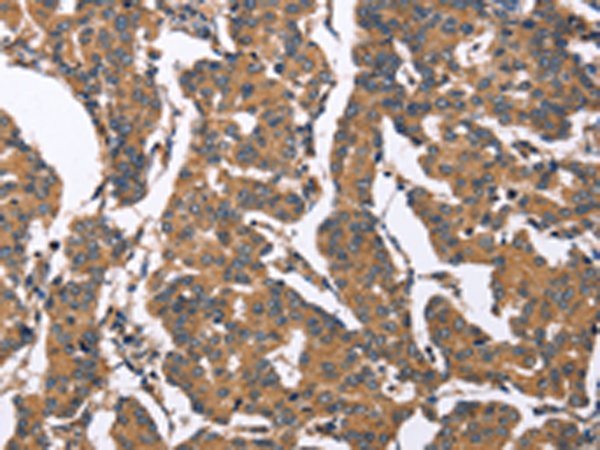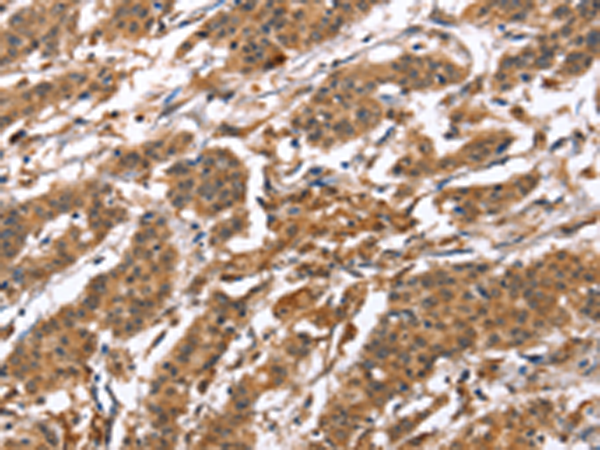

| WB | 咨询技术 | Human,Mouse,Rat |
| IF | 咨询技术 | Human,Mouse,Rat |
| IHC | 1/50-1/200 | Human,Mouse,Rat |
| ICC | 技术咨询 | Human,Mouse,Rat |
| FCM | 咨询技术 | Human,Mouse,Rat |
| Elisa | 1/2000-1/5000 | Human,Mouse,Rat |
| Aliases | NIP2; BNIP-2 |
| Host/Isotype | Rabbit IgG |
| Antibody Type | Primary antibody |
| Storage | Store at 4°C short term. Aliquot and store at -20°C long term. Avoid freeze/thaw cycles. |
| Species Reactivity | Human, Mouse |
| Immunogen | Synthetic peptide of human BNIP2 |
| Formulation | Purified antibody in PBS with 0.05% sodium azide and 50% glycerol. |
+ +
以下是关于BNIP2抗体的3篇参考文献的简要总结:
1. **文献名称**:BNIP2 promotes proliferation and aggressiveness of cholangiocarcinoma via regulating the HIF-1α/VEGF pathway
**作者**:Wang Y, et al.
**摘要**:该研究通过免疫组化(使用BNIP2抗体)发现BNIP2在胆管癌中高表达,且与患者预后不良相关。实验表明BNIP2通过HIF-1α/VEGF通路促进肿瘤血管生成和侵袭转移。
2. **文献名称**:BNIP2 modulates mitochondrial remodeling and autophagy in cardiomyocytes under hypoxic stress
**作者**:Chen L, et al.
**摘要**:研究利用BNIP2特异性抗体进行Western blot和免疫荧光分析,发现缺氧条件下BNIP2通过调控线粒体自噬相关蛋白(如LC3-II和PINK1),影响心肌细胞存活,为缺血性心脏病机制提供新见解。
3. **文献名称**:BNIP2 interacts with YAP to inhibit the Hippo signaling pathway in gastric cancer progression
**作者**:Zhang H, et al.
**摘要**:通过Co-IP(使用BNIP2抗体)和基因沉默实验,证明BNIP2与YAP蛋白相互作用,抑制Hippo通路活性,促进胃癌细胞增殖和迁移。临床样本分析显示BNIP2高表达与晚期分期相关。
注:以上内容为示例性总结,实际文献需通过PubMed、Web of Science等平台检索确认。建议结合具体研究目标筛选最新文献。
The BNIP2 (BCL2/adenovirus E1B 19 kDa interacting protein 2) antibody is a tool used to detect and study the BNIP2 protein, a member of the BNIP family involved in regulating cellular processes such as apoptosis, autophagy, and mitochondrial dynamics. BNIP2 interacts with BCL-2 family proteins, which are critical in controlling programmed cell death, and may also engage with Rho GTPase signaling pathways to influence cytoskeletal organization and cell migration. Its role in hypoxia-related pathways, particularly through interactions with HIF-1α, has drawn interest in cancer research, where dysregulated BNIP2 expression is linked to tumor progression and metastasis.
The BNIP2 antibody is widely utilized in techniques like Western blotting, immunohistochemistry, and immunofluorescence to assess protein expression, localization, and function in various tissues and disease models. Researchers employ it to explore BNIP2's involvement in diseases such as cancer, cardiovascular disorders, and neurodegenerative conditions. Commercial BNIP2 antibodies are typically developed in hosts like rabbits or mice, with validation for specificity and cross-reactivity across species. Ongoing studies aim to clarify its dual roles in pro-survival and pro-death mechanisms, highlighting its potential as a therapeutic target or biomarker in precision medicine.
×